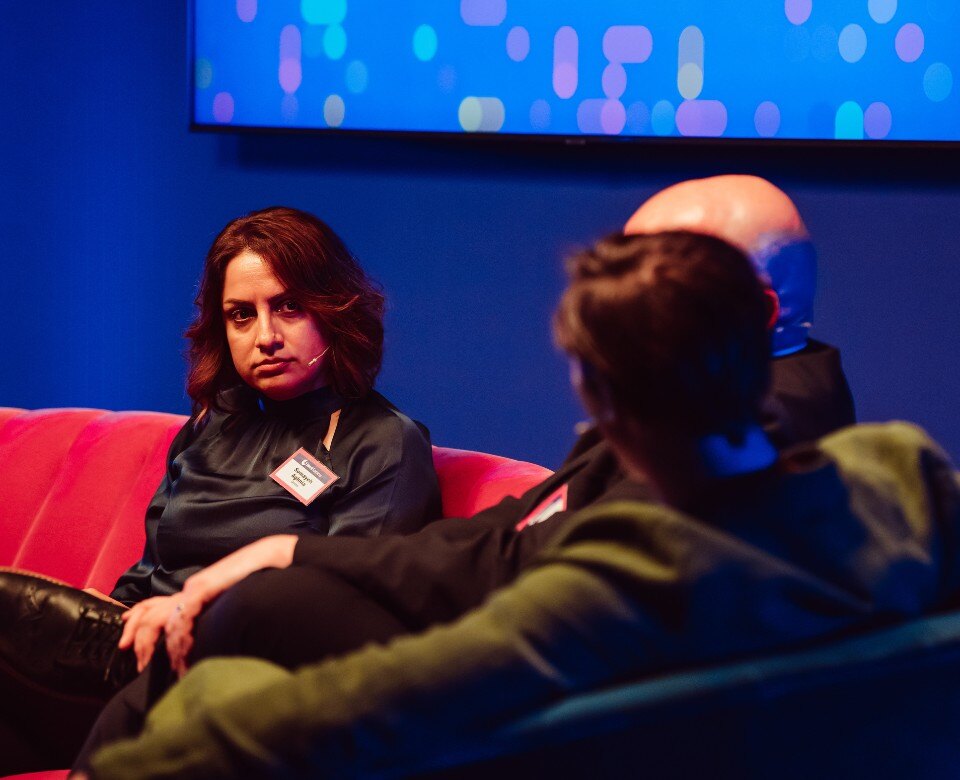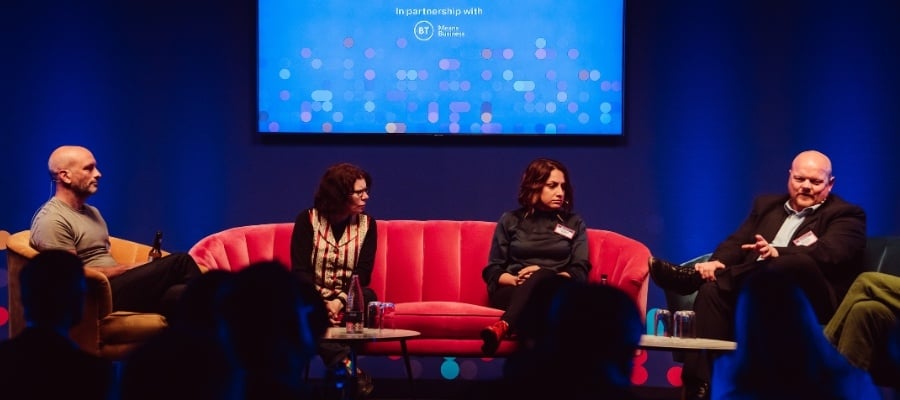
The talent paradox - building technology skills for the future

Kani Talabani
Industry leaders gathered at The Studio, HotTopics’ flagship event for the technology c-suite hosted at Abbey Road Studios, to explore the challenges and strategies in building technology skills for the future amidst a future talent paradox.
Organisations struggle to attract and retain talent proficient in emerging technologies, hindering their ability to fully leverage digital transformations and technological advancements. The roundtable debate delved into the pressing issue of upskilling and reskilling in a rapidly changing technological landscape—a paradox where opportunities for growth and development coexist with significant challenges in meeting the demand for digital, data and technology expertise.
With Peter Stojanovic moderating, the roundtable panellists included:
- Nicola Millard, Principal Innovation Partner, BT
- Somayeh Aghnia, Co-Founder & CEO, Geeks
- Dominic Howson, Chief Transformation Officer, Viridor
- Ash Roots, Founder, Portokali
The talent paradox: Overview
- Technology skills development in an uncertain future
- Keeping up with the pace of change
- Leadership in an AI-powered future
- Your best crystal ball is diversity

Technology skills development in an uncertain future
The "Talent Paradox" arises from a fundamental question: how can we prepare and cultivate skills for a future that remains largely unknown?
Ash Roots, Founder of Portokali, argued that our current education and work structures are rooted in outdated, factory-oriented logic. This system relies on predefined conditions and roles, yet today’s world is anything but predictable.
Technological advancements defy forecasts, rendering it impractical to focus solely on specific subjects or roles. Instead, the emphasis should be on creating conditions that foster continuous learning, adaptability and application.
Sharing a personal anecdote about a conversation with his 13-year-old daughter, Ash highlighted that future job aspirations are less about specific roles and more about the ability to succeed, explore and innovate.
“She wants to be able to feel that she can succeed, explore, be great. She didn't talk about anything to do with a role or a subject.”
This shift reflects a broader trend for Nicola Millard, Principal Innovation Partner at BT. “They're not they're looking for a job with purpose. They're looking for autonomy, they're looking for trust.”
Disengagement in the workforce, despite the skill level, can significantly hinder productivity. The panel agreed that the approach must prioritise nurturing attitudes conducive to learning and growth over merely acquiring specific technical skills.
Keeping up with the pace of change
“Recruit for attitude and then train the skills” is a mantra that resonates for Nicola, especially in the context of AI and other advanced technologies. AI can elevate capabilities, supporting individuals in ways that were previously unimaginable.
Dominic Howson, Chief Transformation Officer at Viridor, believes that fostering a space where people are encouraged to learn and apply themselves enthusiastically is crucial. This environment should provide opportunities to experiment, fail and practice, cultivating a workforce ready to adapt to rapid technological changes.
“If you've got people that have got that hunger, when new technology appears, you can allow them to have a go at it, apply it, try it, see if they could use it.”
The pace of change itself poses significant challenges. Somayeh Aghnia, Co-Founder and CEO of Geeks, pointed out that technological education, particularly in universities, often lags behind current industry practices.
“The new variable is the pace at which it is changing that makes people, organisations, leaders more anxious because we don't have the time to digest what's happening, analyse the impact of it and then be able reflect.”
This disparity creates anxiety among individuals and organisations, which struggle to keep pace with new developments and their implications. Nicola added that addressing this anxiety requires a focus on the “symbiotic relationship” between humans and technology, ensuring that advancements augment human abilities rather than replace them.
Leadership in an AI-powered future
Leadership in the technology-driven future must be reimagined.
“The London School of Innovation is focused on generating or creating the leaders of the future, the leaders of the AI-powered world.” Somayeh argued that LSI aims to cultivate leaders who understand both technology and its broader impact on society.
This involves a commitment to ethics, business needs and the social implications of technology. Future leaders, according to Somayeh, must navigate the intersection of diverse disciplines, ensuring that technological advancements benefit society as a whole.
In this case, she believes an “interdisciplinary” approach is vital. Bringing together diverse skills and perspectives enhances problem-solving and innovation.
In recruiting, Dominic believes that the focus should shift towards individuals who exhibit a willingness to learn and adapt. Traditional job descriptions often fail to capture the dynamic nature of roles in a rapidly evolving market.
“Building your core capability in your own teams is where you find people that are generalists that are capable of understanding a new technology as they come along, working with developing and working with third parties to implement it.”
Instead, hiring for potential and providing the right conditions for growth can be more effective. Onboarding should be more agile, allowing new hires to integrate and contribute quickly.
“Your best crystal ball is diversity”
Diversity and the value of multidisciplinary teams outside the technology sector cannot be understated in Ash’s view.
He argued that mixing different skills and perspectives — creativity, commercialism and technology — leads to better solutions. This is exemplified in teams where diverse expertise such as engineers, data analysts and creatives collaborate to find innovative solutions.
Ash shared an example of his experience at the University of Exeter, where collaborating with a “Shakespeare expert” led to a unique approach, turning a digital strategy into a piece of theatre in order to enhance engagement with technology.
“So your best crystal ball is diversity, because that will give you more than likely a future that you haven't thought of.”
As a “past futurologist” Nicola mentioned her background in psychology and theatre, explaining that this diverse mix has shaped her perspective on technology and human interaction.
She criticised the education system for compartmentalising people into specific categories like “scientist” or “artist” which limits exploration across different disciplines. Nicola herself faced these challenges when she took an interest in maths, physics and english drama.
As a result, “I get very annoyed when people talk about STEM skills because actually I think we should be widening out STEAM.” She advocated for the expansion of STEM to include the arts, integrating diverse backgrounds into technology.
“I firmly believe that we should be looking for STEAM skills, so we should be bringing in people with very diverse backgrounds into tech.” Nicola argued that this not only helps represent a broader user base but also enables effective communication of complex tech concepts, such as blockchain, in accessible and engaging ways.
If you enjoyed reading ‘The Talent Paradox - Building Technology Skills for the Future’, discover more related articles in our C-Suite Insights.
This roundtable debate was made in partnership with BT.
SUBMIT A COMMENT
RELATED ARTICLES
Join the community
To join the HotTopics Community and gain access to our exclusive content, events and networking opportunities simply fill in the form below.
.png?width=250&height=161&name=BT%20(2).png)